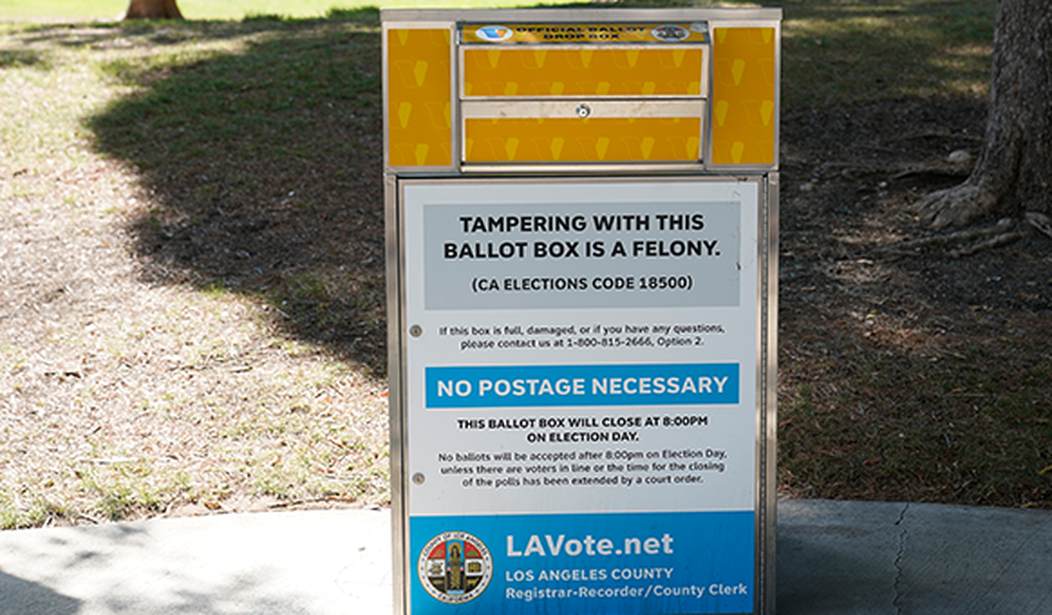(Editor’s Note: This article was originally published on May 15, 2020.)
California Rep. Devin Nunes appeared Fox News At Night with Shannon Bream Wednesday discussing the party’s re-taking of the CA-25 seat formerly held by Katie Hill, among other topics. In order to retain that seat in November, Nunes says, the GOP will have to invest in a “robust ballot harvesting operation.” Thank goodness. (Coincidentally, that was the point I made in a radio appearance Wednesday afternoon.)
Twitter liberals, predictably butthurt about their shellacking and possessing unbearably short memories combined with an abundance of ignorance, pounced on Nunes, accusing him of planning to break the law because he pointed out that “ballot harvesting” is illegal in 49 states.
Guess which state is the one in which it is legal? That’s right. California. It’s a law that was spearheaded by Democrat Asm. Lorena Gonzalez (yes, she of “F*ck Elon Musk” fame) and voted against by every Republican in the legislature.
Republican grassroots activists in California are overjoyed by Nunes’ pronouncement, because they know there is no way other congressional seats will be flipped without it. While state party officials claimed to be shocked at the harvesting that occurred in 2018, they were definitely warned. I know this because I was one of the people who warned them. I was a communications consultant on a congressional race in the state in 2018. The week after the June primary, on a conference call with other stakeholders and with a representative from the CAGOP, I asked what plans the party had for ballot harvesting prior to the general election. None, I was told. When I pressed the issue, saying that the new law gave Democrats the green light to legally do on a large scale what they’d been low-key doing for years, I was told (paraphrasing):
“Well, I don’t think they’re really going to do that. In any event, that’s not something the party has resources for, so if your campaign wants to do it you’ll have to fund it and run it yourself.”
I sat in stunned silence. The representative was right; the campaign, like many in the state, received basically zero help (in any way) from the state party. Of course, we lost. I wasn’t the only one beating the drum, and in a few areas of the state there were efforts at ballot harvesting, but due to infighting within the CAGOP and the use of blacklists, the operations were not of the “robust” type Nunes referenced.
In watching conversations in the lead-up to the CA-25 special election it was apparent that there is some confusion about what ballot harvesting is. Ballot harvesting is when a person who is not related to a voter, and who may be employed by a political campaign, a political party, an interest group, a PAC, or whomever, or who may simply be a volunteer, takes possession of a completed, sealed mail ballot from a voter and returns that ballot to elections officials for the voter.
Ballot harvesting is not supposed to include “helping” a voter fill out their ballot, filling out the ballot for them, helping a voter research candidates, encouraging them to vote for a particular candidate, or paying for a voter’s blank ballot. I say “not supposed to include” because, as I wrote previously, there is evidence of Democrat activists, volunteers, and paid gatherers did just that in California’s 2018 general election. One even admitted as much to the Los Angeles Times.
Prior to the passage of AB 1921 in the fall of 2016, voters who had mail ballots and for some reason couldn’t simply drop them into a mailbox (most counties provide postage-paid envelopes with mail ballots) could have a family or household member return their ballot to the elections office. Period. Full stop. No one else could touch the ballot.
AB 1921 was sold as an “expansion of access” law, because of course it’s too difficult to expect people to complete a ballot they received in the mail, get off the couch, walk to the mailbox, and insert the ballot. But, it really just expands the ways in which elections can be improperly controlled. As a former federal prosecutor wrote in the Wall Street Journal:
Under California’s election laws, it won’t require the iron-fisted control of a political boss or a powerful machine to improperly affect election outcomes. Registration is automatic, any ballot can be marked in unknown circumstances and any interested person can collect and deliver it (or not).
Before conservatives in the rest of the country shrug this off as, “Oh, it’s crazy California; let them suffer the consequences of their votes,” it should be glaringly clear that Dems in Congress want this model spread throughout the country. Also, it illustrates that maybe, just maybe, “most” Californians did not vote for the insanity under which they live.
There are numerous problems with AB 1921 that undermine the security of harvested ballots, provide no audit trail, and ultimately cast doubt on the integrity of the election process. As an advocacy group, Counted as Cast, warned while the bill was under debate:
“AB 1921 would allow anybody to walk into an elections office and hand over truckloads of vote by mail envelopes with ballots inside, no questions asked, no verified records kept. It amounts to an open invitation to large-scale vote buying, voter coercion, “granny farming,” and automated forgery. AB 1921 solves no problem that a simple stamp can’t solve.”
In 2018 more Californians received mail ballots than ever before, thanks to the California Voter’s Choice Act. This year, Gov. Gavin Newsom has already signed an executive order requiring that every registered voter be mailed a ballot for November’s general election, meaning it’s open season for ballot harvesting, coronavirus or not.
The new ballot harvesting law states:
“A vote by mail voter who is unable to return the ballot may designate another person to return the ballot to the elections official who issued the ballot, to the precinct board at a polling place or vote center within the state, or to a vote by mail ballot dropoff location within the state…The person designated shall return the ballot in person, or put the ballot in the mail, no later than three days after receiving it from the voter or before the close of the polls on election day, whichever time period is shorter.”
These time frames are crucial. There is no reason a “harvester” needs to hold on to a ballot for three days, except to deny their political opponent information. As mail ballots are returned they’re entered into the county’s system, allowing the voter to track and confirm that their ballot has been received and processed. The full data (meaning, specifically which voters have returned ballots) is available to campaigns, and data regarding the number of ballots returned, precinct, and demographic information, is available to political data analysts, who publicize the information. If a campaign collects ballots from coveted “No Party Preference” voters on the Friday before Election Day then returns them Monday afternoon, there won’t be enough time for the other side to know that the voter has already returned their ballot and that campaign will waste time contacting that voter in an attempt to retrieve the ballot.
Of course, since Republicans in California weren’t doing harvesting in 2018, that wouldn’t have handicapped them then. But, aside from competitive problems, the three-day time period is a major security issue. Worst case scenario, political operatives with nefarious intent could be examining the contents of the envelope to determine if this is a ballot they really want counted, and if not, that ballot just might not make it to the elections officials. Since there is literally no mechanism for documenting the chain of custody of the ballot once it leaves the voter’s hands, there is no consequence for shenanigans.
The law does require county elections officials to include space for the “signature of the person authorized to return the vote by mail ballot” and for either the voter or the “person authorized” to state “the relationship to the voter of the person authorized to return the vote by mail ballot,” but also says:
(c) Notwithstanding paragraphs (9) to (11), inclusive, of subdivision (a), a ballot shall not be disqualified solely because the person authorized to return it did not provide on the identification envelope his or her name, relationship to the voter, or signature.
So if the ballot won’t be disqualified because it doesn’t contain the name of the “person authorized” to return the ballot, why would any harvester put their name on it? Or if they put a name to satisfy the voter/stranger whose ballot they’re harvesting, why would they put their own?
When the ballot is returned, elections officials don’t ask for any identification from the person dropping off the ballot, though according to Los Angeles County’s 2018 poll worker manual they’re supposed to require the person to sign the envelope. They could sign Marilyn Monroe or Dweezil Zappa and get away with it.
Ballot harvesters can be paid under this law, which also contains the toothless provision that harvesters cannot be paid on the basis of the number of ballots returned.
In an attempt to seem legit, the law concludes with a warning of possible criminal charges if the harvester engages in acts like “fraud, bribery, intimidation, and tampering with or failing to deliver the ballot in a timely fashion.” But, if they don’t know the identities of people dropping off ballots, how can they possibly press charges? Feature or bug?
There are several things missing from this law. In California, with the Democrat supermajority (which might be a little smaller after November), ballot harvesting is not going away. Knowing that, these are the changes that need to be made.
- Mandatory training and registration of ballot harvesters (with zero state “registration fees” charged), including fingerprinting. If we expect poll workers to be trained and adhere to procedures and regulations, the same should apply to people working with mail ballots.
- Required harvester ID check upon ballot drop-off at the polling place.
- For harvested ballots that are mailed in or dropped in an official ballot collection container, a requirement that the harvester’s ID number (received during their training and registration process) be entered on the envelope along with the harvester’s signature. This will ensure the “auditability” (as Stacey Abrams mentioned on her MSNBC appearance with Joe Biden) of ballots.
- Inclusion of a tear-off receipt on all mail ballots that harvesters must leave with a voter, listing the harvester’s name and ID number. If the ballot never makes it to the voting center, officials will know whom to contact.
All Americans of all political preferences should want every vote legally cast to be counted. Confidence in our election process is fundamental to the legitimacy of our government, state or federal, and this process doesn’t inspire an ounce of confidence. As GOP California Rep. Ken Calvert said:
“When unknown third parties are handling hundreds or thousands of ballots with no transparency, voters are understandably concerned. Our election laws should always be focused on what protects the confidence and integrity of our elections, not what gives one party an advantage over the other.”
Right now, despite Tuesday’s big win, California Republicans justifiably don’t have confidence in the integrity of their state’s elections. Judging by social media posts and commentary from the pundit wing of the Democrat party, a number of California Democrats have joined their ranks. Will there be enough of them to force a change to the state’s terrifyingly insecure ballot harvesting law? We’ll see.















Join the conversation as a VIP Member